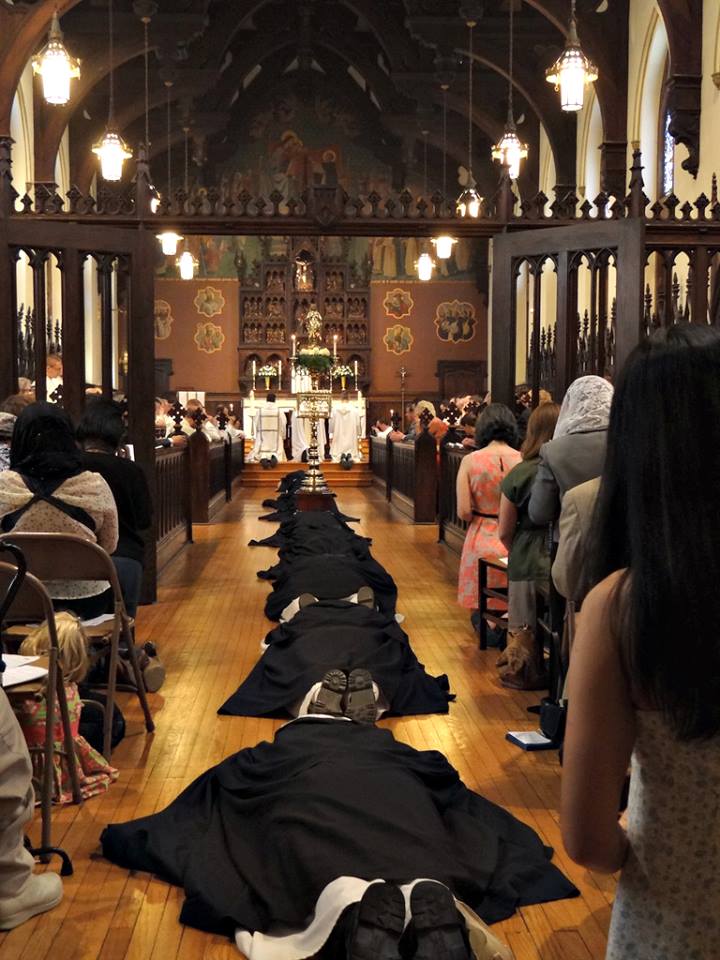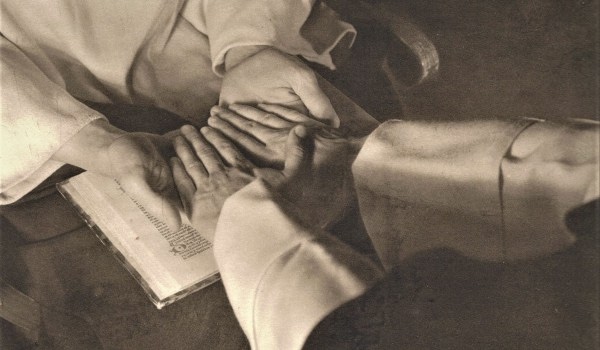When considering religious life, especially in the Order of Preachers, who only take one vow, obedience, it was this vow that freaked me out. It still does. In fact, my fear of this vow, very justifiably so, has gotten worse with thirty years of experience of human beings in organizations.
Let me be clear, if you think this vow, obedience, at the end of the day, is taken in any metaphorical sense by the Dominicans or any other Catholic religious order, allow me to disabuse you in kindness and Christian charity of that delusion. They do not. They do not.
Everything else is generally light and happiness, but this moment is most solemn, most solemn. And, in the time one spends in religious life, in general, by the default of time elapsed, disqualifies one from a career external to religious life, so the sacrifice is real and permanent as time progresses. It is. No do-overs. They play for keeps.
Catholicism, I have found, in general, if taken seriously, disqualifies you somewhat from many practical careers, by definition. Or, at least it makes them harder to practice in the way they are secularly practiced. Deo gratias!!! And, a decade or more of religious life, means mainly Church employment, or entry level roles if not.
Religious superiors are human, too. They have all the foibles, temptations, errors any of us do. And, so my apprehension not only remains after thirty years, it has become worse.
Ego N. spondeo obtemperat praecipienti Deo et beatae virgini, et beato Dominico et tibi famulam tuam N., et ad posteros, secundum Regulam Sancti Augustini ordo et institutum, usque ad mortem.
I, N., pledge obedience to God, the Blessed Virgin, to Blessed Dominic, and to you, N., and your successors, according to the Rule of Saint Augustine, and the institute of the order, until death.
This isn’t why I left. As I mentioned in prior posts, “God spoke to me” in my sleep Holy Thursday evening, the anniversary of the priesthood, and awoke with conviction, unreasoned, Good Friday morning. Who says God does not an ironic sense of timing?
Even as a Lay Dominican, the errors of human superiors is too painfully evident, and I don’t play well with such. I just don’t. This would be a cross had I pursued religious life. But, crosses, as Christians, are to be embraced through supernatural grace, never our own efforts. It is impossible, impossible.
It is not possible, as well, in reality, now, I realize to revisit this moment now in life. His will has been done. And, I am sanguine, and grateful. May it always be so, Lord. May it always be so, regardless of events, regardless. However, I sometimes now consider how I might approach this moment given thirty years of experience. Being young, and all the limitations lack of experience provides, I was decidedly and only relying on my own powers, quite understandably so. And, knowing myself to the extent, not incorrectly, as I did, my fears were reasonable and correct. It is ONLY through supernatural grace, never, never, our own efforts is this commitment possible to be lived out.
Marriage has its own vow/form of obedience, in love. It is not the fear of the reality and pain being subject to human superiors in religious life or even marriage, rather it is the love of Christ, intense enough, relying enough upon Him alone, His grace, His will, our total, complete surrender to Him, through Him & His supernatural grace, that permits living these faithfully.
-by Rev Gabriel of St Mary Magdalen, OCD, Divine Intimacy, Baronius Press, (c) 1964
Presence of God – O Jesus, teach me to see only You in my superiors.
MEDITATION
An excellent instruction from St. John of the Cross says: “Never look upon your superior, whoever he may be, with less regard than upon God Himself” (Precautions). If we do not have this supernatural spirit which makes us see God in the person of our superior, our obedience cannot be supernatural. It is necessary to be a soul animated by this motive alone: I obey because my superior represents God for me and speaks to me in His Name; my superior is another Christ to me: Hic est Christus mens. This is my Christ.
We should not obey through the motive of human confidence in the person of our superior: because he is intelligent, prudent, capable, because he understands or likes you, and so forth. That is human obedience, the fruit of human prudence—a good act in itself but not supernatural. Neither should we obey because what we are told to do is the most perfect; again this is not the real reason for obedience. We must obey only because God wills whatever our superior commands. The one exception is an order involving sin, which of course God cannot want, or a command not conformable to the Rule or Constitutions which we have embraced. In either case, obedience would be unlawful. Apart from these exceptions no limit should be put to our obedience. We need not hesitate through fear that the superior is asking something less perfect. Even if he commands what is objectively less perfect than its alternative (for instance, to take some rest instead of working), it would nevertheless be the more perfect thing for us. By the simple fact that the superior has expressed an order, it is clearly the fulfillment of that, and not something else, that God wants from us at the moment. It could very well be that in the abstract we see the possibility of performing an action more perfect than what we have been told to do, and that our idea is better than our superior’s. But in reality there is no doubt about it: nothing can be more perfect for us than what God commands by means of our superior.
COLLOQUY
O Lord, increase my spirit of faith, so that I will see You in the soul of my superior. May I repeat, spontaneously and sincerely, in his presence, Hic est Christus mens! Only by this way of obedience will a life of continual contact and uninterrupted for “Supernatural Obedience” postintimacy with You be possible. If I find You present and living in the Sacrament of the Altar under the veil of the Eucharistic species, always ready to welcome and nourish my soul, I can also, but in a different way, find You hidden in the person of my superior, through whom You speak to me, always ready to disperse my doubts, to manifest Your holy will, and to direct and guide me along the road You have chosen from all eternity for my sanctification.
O Lord, why should I stop at the human appearances of my superiors? Such an attitude will only serve to keep me from finding You in them and recognizing Your will in theirs. Help me, O God, to pass over all the human aspects of obedience and to put myself in contact with You and Your divine will. Just as in the Eucharist I do not halt at the created species of bread and wine, so I ought not in obeying to consider the person of my superior, but only Your will, which reaches me under the appearance of a human order or command. O Jesus, what a great mystery! The Eucharist gives me Your Body, Your Blood, Your divinity—such is the power of the Sacrament which You have instituted. Obedience gives me Your will and makes me communicate with it—such is the power of the authority which You have established.
Once I have understood this profound truth, how can I still dare to argue or hesitate at the commands of my superiors? “It would be a terrible thing if God were to be telling us plainly to go about His business in some way, and we would not do it but stood looking at Him because that gave us greater pleasure. A fine way it is of advancing in the love of God to tie His hands by thinking that there is only one way in which He can benefit us” (Teresa of Jesus Foundations, 5). No, Lord, grant that I may never act thus. I shall follow You wherever You lead me by means of holy obedience.”
Love, pray for me,
Matthew


